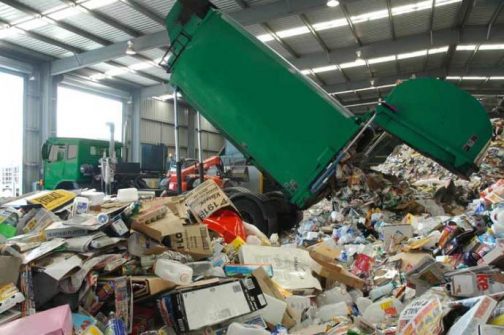Backward Steps: The Australian Recycling Sham

The green conscience received a setback last week with revelations that the Australian recycling industry is not what it seems. The middle-class sensibility here is simple and dismissive: bin it and forget about it. Place the sorted items in the appropriate set place and let others do the rest.
Such an attitude means that the Australian recycler can been caught unawares. A glance at the general talking points of Australia’s recycling prowess shows confidence, even smugness. Planet Ark, for instance, notes that the recycling rate of 51 per cent of household waste is “relatively on par with recycling rates in northern European countries and exceeding the mean recycling rate of all 28 countries in the EU of 42 percent.”
The pat on the back follows. “This is quite an achievement for Australia considering the unique landscape and dispersed population that our waste services need to navigate.” (This self-congratulatory tone also works in reverse: a justification, for instance, as to why Australia’s internet rates are some of the slowest in the developed world).
Where Australia lacks punch is the recycling of electronic waste, limping and lagging behind European states. In terms of battery recycling, for many years mandatory in Europe, the program remains in tight swaddling clothes.
The sense, then, of the conscientious recycler, is a strong one, alert and aware about doing one’s duty in environmental conservation, or, at the very least, avoiding environmental ruination. But the challenges as to how effective such behaviour has been are pronounced and problematic.
Some of this can be gathered from an ABC program which has made it an ongoing project to wage a “War on Waste” fronted by satirist and mocker-in-chief Craig Reucassel. While it has an instructional, even at points hectoring tone, the production makes valid points that burst the euphoric bubble of the recycling clan.
For one thing, the proportion of what is appropriately placed in bins for kerbside collections needs challenging. Audits suggest that upwards of 10 per cent of material placed for recycling – in terms of volume – should find another destination.
As Trevor Thornton explains, “The most common ‘contamination’ items include plastic bags (both full and empty), textiles, green waste, polystyrene (Styrofoam) and general rubbish.” The first item on this ticket list – plastic – is particularly noxious, finding its way into the reject pile that is duly buried in a long, slow-decaying exile in landfill.
And, suggests Thornton in a myth-debunking tone, there is little need rinsing and cleaning the assortment of cans and containers for the recyclers, as “today’s recycling systems can easily cope with the levels of food often found in or on these containers.” Such industriousness wasted!
Then come specific items that may only be partially recyclable, with the grandest culprit being the ubiquitous takeaway coffee cup. Here, the messages vary. Place them in co-mingled and mixed paper bins, and all is dandy. Not so, claim the War on Waste fraternity, which notes that only part of the cup would qualify.
Nor is the concept of re-use necessarily high priest gospel. Be wary, for instance, of the wisdom behind reusing your ceramic cup. Paper disposable cups and Styrofoam come out ahead of the re-use facility here. According to a Canadian study by Martin B. Hocking, one ceramic cup would have to be put through the paces 39 times to make it more viable than the former, and 1,006 times when compared with the latter. It all has to do with energy consumption in washing reusable cups, “a less important factor in cub fabrication.”
Even more deflating was the report by the investigative Four Corners outfit that was aired in its usual Monday segment to Australian audiences thinking that they had gotten on top of the issue of what to do with glass.
They had good reason to. Again, Planet Ark, in a glowing overview of the state of recycling in Australia, asserts that glass bottles in Australia “have generally 40 – 70 percent recycled content, which means that your bottles and jars go directly into the manufacture of new bottles and jars at an energy saving.”
There’s a snag in all of this. Hundreds of thousands of tonnes of glass, rather than finding their way to the appropriate recycling points, reach stockpiles and disappear in landfill. One particular fallen angel in the business, recycling company Polytrade, decided to go public with the view that the recycling market in Australia had run its course of sustainability.
According to Polytrade Rydalmere manager Nathan Ung, “We are back in the dark age and we don’t know what to do.” The reason for being plunged into such darkness was one of quantity and viability, a product that had gotten ahead of itself. “The predicament at the moment is there’s no viable market anymore, there’s nowhere for the glass to go.”
The stresses are manifold. Recycling companies are feeling the pinch of falls in commodity prices. Flexibility with local councils is nigh impossible, with long-term contracts between the companies and local government lasting for as long as 10 years.
Stockpiling limits are enforced by the Environmental Protection Agencies across the country, though this, according to the Four Corners report, is a premise that must be challenged. Certainly, when it came to New South Wales, companies engaged in the task of recycling were being somewhat flexible in their reading of the regulations, behaviour inspired by a good degree of desperation. In rural and regional Australia, landfilling has become de rigueur.
A dark story, then. Behind every environmental claim to fame and cocky advance in greening the earth is a qualification, a half-step back that risks, at times, becoming a reverse canter. Well it may be that Australians are generally more aware of the need to recycle, placing their green consciousness into hyperdrive. But this is a country of vastness, insufficient regulation and scattered responses across such industries vulnerable to price changes. It remains to the participants to assure those still keen to sort out their weekly waste whether it’s all worth it.
 Dr Binoy Kampmark is a senior lecturer in the School of Global, Urban and Social Studies, RMIT University. He was a Commonwealth Scholar at Selwyn College, University of Cambridge. He is a contributing editor to CounterPunch and can be followed on Twitter at @bkampmark.
Dr Binoy Kampmark is a senior lecturer in the School of Global, Urban and Social Studies, RMIT University. He was a Commonwealth Scholar at Selwyn College, University of Cambridge. He is a contributing editor to CounterPunch and can be followed on Twitter at @bkampmark.









10 comments
Login here Register here-
labyrinth1205
-
Keitha Granville
-
economicreform
-
@RosemaryJ36
-
Ian Joyner
-
passum2013
-
Susan
-
king1394
-
Harquebus
-
Rude Record
Return to home pageThe 4Corners report was surely interesting, but left many questions unaddressed and unanswered. I was curious about how and or why the price for recycled glass had so catastrophically plummeted that using virgin materials, with all costs of mining, refining etc, was bizarrely cheaper than re-melting the existing recycled stock. Is the market manipulated? Is there something odd going on?
There is only one way to make recycling the ONLY thing to do – make the materials for the brand new product much more expensive. Manufacturers need to have deterrents to using new, by making recycled cheaper. Simple.
We need to make do with less from the planet and more from our waste.
I would make the simple and rather obvious point that if goods were manufactured to endure, i.e. not manufactured with planned obsolescence, then there would be less need for recycling.
My understanding from the 4 Corners program was that it is cheaper to import glass containers than to recycle glass to make new ones. But I also believed that glass could be crushed to form suitable aggregate and replace mined sand.
A rather unfortunate result of exposing this rort is that people might give up and not bother putting things in the recycle bin. That would be a big mistake. We must insist that the recycling industry lift its game.
On the other hand, we could say recycling itself is lazy – just don’t use those plastic bags in the first place. Many items of packaging are just for marketing purposes. From a museum in Singapore I got the three R’s:
Refuse
Reuse
Recycle
The best way to handle waste is not to generate it in the first place.
with glass it can be crushed then tumble heated into pellets like sand and small gravel for cement
If each of us had to recycle our own garbage we would all be a bit more careful about our consumption.
Whatever happened to the capitalist idea that the innovator would make new and better products as the market developed. Here are raw resources such as glass being thrown away and made unusable. What a failure of the market! It is obvious that the supply of cheap products from overseas needs to be stopped. Mining enterprises that dig up and sell raw materials for glass could also be stopped.
Did anyone else notice the large number of diesel fueled machinery supporting the whole process? Moving a growing mountain of waste that is practically worthless.
“Even as a waste disposal site, the world is finite.” — William R. Catton Jr.
“There is wealth in waste and riches in rubbish” Karen Ellis / RUDE Activist at Facebook @ruderepair